|
|
|
Sort Order |
|
|
|
Items / Page
|
|
|
|
|
|
|
| Srl | Item |
| 1 |
ID:
150416
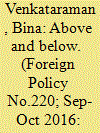

|
|
|
| 2 |
ID:
102048
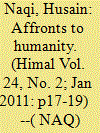

|
|
|
| 3 |
ID:
120655
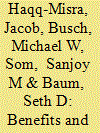

|
|
|
|
|
| Publication |
2013.
|
| Summary/Abstract |
Deliberate and unintentional radio transmissions from Earth propagate into space. These transmissions could be detected by extraterrestrial watchers over interstellar distances. This article analyzes the harm and benefits of deliberate and unintentional transmissions relevant to Earth and humanity. Comparing the magnitude of deliberate radio broadcasts intended for messaging to extraterrestrial intelligence (METI) with the background radio spectrum of Earth, we find that METI attempts to date have much lower detectability than emissions from current radio communication technologies on Earth. METI broadcasts are usually transient and several orders of magnitude less powerful than other terrestrial sources, such as astronomical and military radars, which provide the strongest detectable signals. The benefits of radio communication on Earth most probably outweigh the potential harm of detection by extraterrestrial watchers; however, the uncertainty regarding the outcome of contact with extraterrestrial beings creates difficulty in assessing whether or not to engage in long-term and large-scale METI.
|
|
|
|
|
|
|
|
|
|
|
|
|
|
|
|
| 4 |
ID:
124958
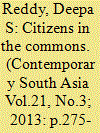

|
|
|
|
|
| Publication |
2013.
|
| Summary/Abstract |
This essay is based on ethnographic fieldwork conducted with the Indian community in Houston, as part of a National Institutes of Health and the National Human Genome Research Institute-sponsored ethics study and sample collection initiative entitled 'Indian and Hindu Perspectives on Genetic Variation Research'. Taking a cue from my Indian interlocutors who largely support and readily respond to such initiatives on the grounds that they will undoubtedly serve 'humanity' and the common good, I explore notions of the commons that are created in the process of soliciting blood for genetic research. How does blood become the stuff of which a civic discourse is made? How do idealistic individual appeals to donate blood, ethics research protocols, open-source databases, debates on approaches to genetic research, patents and Intellectual Property regulations, markets and the nation-state itself variously engage, limit or further ideas of the common good? Moving much as my interlocutors do, between India and the USA, I explore the nature of the commons that is both imagined and pragmatically reckoned in both local and global diasporic contexts
|
|
|
|
|
|
|
|
|
|
|
|
|
|
|
|
| 5 |
ID:
074642
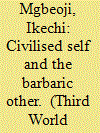

|
|
|
|
|
| Publication |
2006.
|
| Summary/Abstract |
In the aftermath of the military conflicts of 1936 - 45, there seemed to be a global renunciation of war as an instrument of state policy. Shortly thereafter, however, decades of ideological attrition between the major powers and the inherent perversion of postcolonial states reduced the solemn declarations of 1945 to ineffectual rhetoric. Underpinning the decline and demise of a human-centred approach to global peace and security is the enduring notion of the civilised self and the barbaric other. The polarisation of humanity between camps of the savage and the civilised has continued to animate international policy making despite denials. This paper argues that a rejection of the polarities is imperative for the success of the emergent concept of human security.
|
|
|
|
|
|
|
|
|
|
|
|
|
|
|
|
| 6 |
ID:
122005
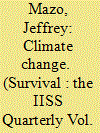

|
|
|
|
|
| Publication |
2013.
|
| Summary/Abstract |
Climate change caused by global warming is, arguably, a serious, even existential, threat to the world order and to the welfare of humanity. No one really knows; there are many uncertainties around the rate of warming and the severity of its environmental and social impacts, and hence the most effective, and cost-effective, ways to avoid or ameliorate them. But over the last five or six years, public discourse has been driven less by policy needs and more by punditry. The propagation of myths and misconceptions, whether deliberate or inadvertent, continues to poison the debate over how to mitigate or adapt to climate change.
|
|
|
|
|
|
|
|
|
|
|
|
|
|
|
|
| 7 |
ID:
127769
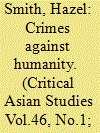

|
|
|
|
|
| Publication |
2014.
|
| Summary/Abstract |
The United Nations Human Rights Council (UNHRC) Commission of Inquiry, established in 2013 to investigate human rights violations in North Korea, identified food rights violations, among other abuses, as potentially constituting crimes against humanity. A contradiction arises in that UNHRC claims of food rights violations in the DPRK are not congruent with the statistical indicators emanating from the UN humanitarian and development agencies that have worked in the DPRK since the mid 1990s and that have engaged in and published substantial research on food, nutrition, and health. The author of this article contends that North Korea has an oppressive government and argues that the lack of transparency makes the many things that are unknown about North Korea, especially its opaque penal system, of legitimate ethical and political concern. Reasonably good data on issues pertaining to social and economic rights do exist, however, as this article shows. The inconsistency between the received wisdom on food and nutrition is of concern because the potential consequences of a state being judged as committing crimes against humanity include military intervention and consequent threats to life for millions. This article reconsiders how and why the received wisdom becomes unchallenged and unchallengeable in scholarly, policy, and media discourse. Inconsistency and misrepresentation is not primarily due to conscious bias but much more because of the unconscious adoption of a securitized perspective through which knowledge about North Korea is filtered. The article argues for reframing North Korean human rights issues on the basis that North Korean society is neither unique nor unknowable.
|
|
|
|
|
|
|
|
|
|
|
|
|
|
|
|
| 8 |
ID:
058963
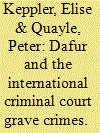

|
|
|
| 9 |
ID:
103754
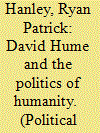

|
|
|
|
|
| Publication |
2011.
|
| Summary/Abstract |
Recently a call has gone up for a revival of the "politics of humanity." But what exactly is the "politics of humanity"? For illumination this paper turns to Hume's analysis of humanity's foundational role in morality and modern politics. Its aims in so doing are twofold. First, it aims to set forth a new understanding of the unity of Hume's practical and epistemological projects in developing his justifications for and the implications of his remarkable and underappreciated claim that humanity is the only sentiment on which a moral system can be founded. Second, by attending to Hume's substantive definition of humanity and its relationship to benevolence and sympathy in particular, it aims to clarify the relationship between the principal elements of the politics of humanity: "humanism" or secularism, "humane" or other-directed values, and mutual recognition of our shared "humanness."
|
|
|
|
|
|
|
|
|
|
|
|
|
|
|
|
| 10 |
ID:
078266
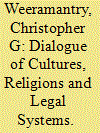

|
|
|
|
|
| Publication |
2007.
|
| Summary/Abstract |
The following is an edited version of the La Trobe University Centre for Dialogue inaugural annual lecture delivered by Judge Christopher G. Weeramantry to mark the launch of the Centre at the Great Hall of the National Gallery of Victoria, Melbourne, 15 August 2006.
1 1?This essay is an edited version of the La Trobe University Centre for Dialogue inaugural annual lecture to mark the launch of the centre at the Great Hall of the National Gallery of Victoria, Melbourne, 15 August 2006
|
|
|
|
|
|
|
|
|
|
|
|
|
|
|
|
| 11 |
ID:
152599
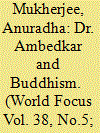

|
|
|
|
|
| Summary/Abstract |
Ambedkar was convinced that conversion will draw the Dalits out of their isolation. To him, Buddhism as a philosophy based on justice and not on the salvation of the soul could be the right religion for the Dalits. It was not meant to be an escape but a collective revolt that also , made a significant step in the resurgence of Buddhism in the country of its origin in all the glory of the humanity it preached.
|
|
|
|
|
|
|
|
|
|
|
|
|
|
|
|
| 12 |
ID:
119979
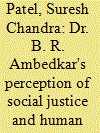

|
|
|
| 13 |
ID:
130808
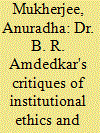

|
|
|
|
|
| Publication |
2014.
|
| Summary/Abstract |
Ethics and morality are the milestones of civilization in the true sense of the term. These concepts again are not static but evolve with greater implications and subtler nuances as humanity strives to grow towards perfection- the ultimate end of existence. ' whether biologically or spiritually. In the context of Indian thought, the traditional, age-old dictums of ethics and morality. having undergone numerous interpretations and changes have experienced a new set of values,' however latent in the traditional interpretation of Dharma or Niri- with the advent of" nationalism, the emergence of a new nation-state and the concurrent vision of human rights. The Constitution of India fully recognizes the moral as at par with the modem, that is, the western ideals of morality in the realization that in the context of Dalit uprising in modern India, the traditional ideals of ethics and morality are to be reviewed. Obviously this shows that what is legal should be ethical and moral or rather. what is ethical and moral tnust have its place in law. It is from this perspective that the modern-day Dalit struggle against injustices, age-old as they are. are to be seen and Dr.B.R. Ambedkar's initiation to this struggle was aimed at bringing ethics and morality to work at the state level, subjugating the Nili forest while lawgivers to take a backseat before the universal laws of morality. To understand Ambedkar's stand on the place of ethics and morality in Hinduism, one must see the reasons that made him strike out at the roots of Hindu social ethics. The Hindu social life was traditionally ruled by Dilemma. Dharma guided a Hindu's'Iife from birth to death by a set of rules strictly laid out for everyone in society. The observation of these rules was morality and the underlying ethics of these duties and rights was ?rst ofall, societal good, i.e., good for 'all. The second part of this ethics was that by observing this social morality, an individual will attain perfection. In accordance with these concepts, the Dharmas/zastras dictate the functions ofthe state and the king. The Nili and Dandanili emanate from one source and with one ideal- that is to maintain the social order by arranging for the speci?c duties of each and every member of society. Consequently. rights came as group rights and institutional rights as laid out in the Dharamshastra'. And over and above everything was the belief in the law of Karma that sanctified the rule of l/Z7I'l7aS/1I'uII7(l, or ones station in life as prescribed by onc's birth. These two essential features of Hindu society made it a highly stratified one so that the passage of' centuries only tightened the rules and the rituals pertaining to these two rules. The solemn and noble hymns of Rigveda. where the philosophy of Vedic seers and poets as the world being one and where everyone was the other's kin. I Va.t'zzdlmibu Kzzrumba/(um )' is the spirit of the ancient Indian Vedic realization. The utmost ideals of human dignity with the universal ethics of righteous behavior and the universal morality of conscientious behavior were preached in their fullest glory. . '
|
|
|
|
|
|
|
|
|
|
|
|
|
|
|
|
| 14 |
ID:
114702
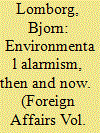

|
|
|
|
|
| Publication |
2012.
|
| Summary/Abstract |
Forty years ago, the Club of Rome produced a best-selling report warning humanity that its escalating wants were on a collision course with the world's finite resources and that the only way to avoid a crash was to stop chasing economic growth. The predictions proved spectacularly wrong. But the environmental alarmism they engendered persists, making it harder for policymakers to respond rationally to real problems today.
|
|
|
|
|
|
|
|
|
|
|
|
|
|
|
|
| 15 |
ID:
132834
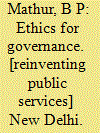

|
|
|
|
|
| Publication |
New Delhi, Routledge, 2014.
|
| Description |
xii, 396p.
|
| Standard Number |
Pbk
|
|
|
|
|
|
|
|
|
|
|
|
Copies: C:1/I:0,R:0,Q:0
Circulation
| Accession# | Call# | Current Location | Status | Policy | Location |
| 057861 | 351.54/MAT 057861 | Main | On Shelf | General | |
|
|
|
|
| 16 |
ID:
130822
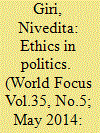

|
|
|
|
|
| Publication |
2014.
|
| Summary/Abstract |
Till recently when India passed through its l6th general Elections, the election Commission of India appealed Indian citizens to select candidates and dump the criminals and the corrupt ones. It also urged the voters to sign a pledge to be ethical while casting their votes in the coming Lok Sabha elections. The Election Commission also appealed the voters to cast their votes without fear or greed, and without keeping caste, religion and creed consideration in mind. The commission's letter also stated that electing a candidate is not merely a citizen's right but his/her responsibility. Ethics and morality have been the hallmark of public life in India since ancient times. Rulers were expected to observe stricter ethical values. Ethics and politics, in other words, were inseparable. This ethical and moral legacy was inherited by its national leaders, who demonstrated a high degree of probity and honesty in public life during the freedom struggle. The early national leaders and political philosophers believed that politics without morality is a thing to be voided. However, in recent years there is a general feeling that all is not well with the Indian political system which is functioning under great strain. It has been noticed and concerns are being expressed over the general decline of values in public life. Recent trends in politics, however, appear to have created an impression as if, the capacity of Indian democratic system to ensure integrity in public life is increasingly going down.
|
|
|
|
|
|
|
|
|
|
|
|
|
|
|
|
| 17 |
ID:
121598


|
|
|
|
|
| Publication |
2013.
|
| Summary/Abstract |
Although pacifism and nonviolence bear a close relationship to one another historically, pacifism is the ideological assertion that war and violence should be rejected in political and personal life, whereas nonviolence refers to a distinct set of political practices. Unlike other modern ideologies such as liberalism and socialism, pacifism has never gained widespread acceptance among a significant portion of humanity and seems to remain a minority position among most of the peoples of the world. Even among those who use nonviolent techniques, the conventional wisdom that physical violence is necessary under certain circumstances often prevails. However, a growing body of empirical evidence shows that the methods of nonviolence are more likely to succeed than methods of violence across a wide variety of circumstances and that more people are using nonviolence around the world. At the same time, both the effectiveness of military and material superiority in achieving political ends and the incidence of warfare and violence appear to be waning. In a remarkable example of convergence between empirical social science and political theory, explanations for the effectiveness of nonviolence relative to violence point to a people-centered understanding of power. This research can provide a basis for a reinvigorated and pragmatic brand of pacifism that refocuses the attention of political scientists on the organization, actions, and loyalties of people as opposed to technologies of domination and destruction.
|
|
|
|
|
|
|
|
|
|
|
|
|
|
|
|
| 18 |
ID:
110978
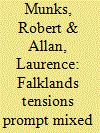

|
|
|
|
|
| Publication |
2012.
|
| Summary/Abstract |
Argentine Vice-President Amado Boudou on 2 February responded to recent developments in the Argentina-UK territorial dispute over the Falklands Islands (Malvinas) by asserting that "British colonialism is a shame for humanity". That statement came on the day that Prince William, second in line to the UK throne, arrived in the South Atlantic islands to begin a six-week tour of duty as a rescue helicopter pilot, and only two days after the UK had announced the deployment of a Type-45 destroyer to the area. Both of those actions have been presented by the UK authorities as "routine". If that is the case, it has not been perceived that way in Argentina, where a range of political figures from both government and opposition have condemned the UK moves as bellicose and threatening.
|
|
|
|
|
|
|
|
|
|
|
|
|
|
|
|
| 19 |
ID:
099101
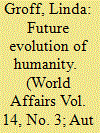

|
|
|
| 20 |
ID:
099096
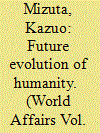

|
|
|
|
|
|
|
|